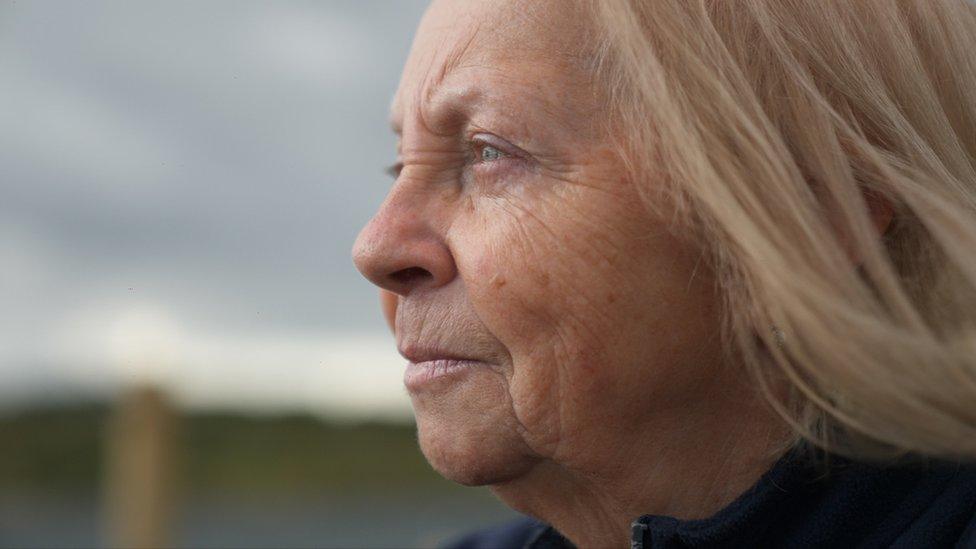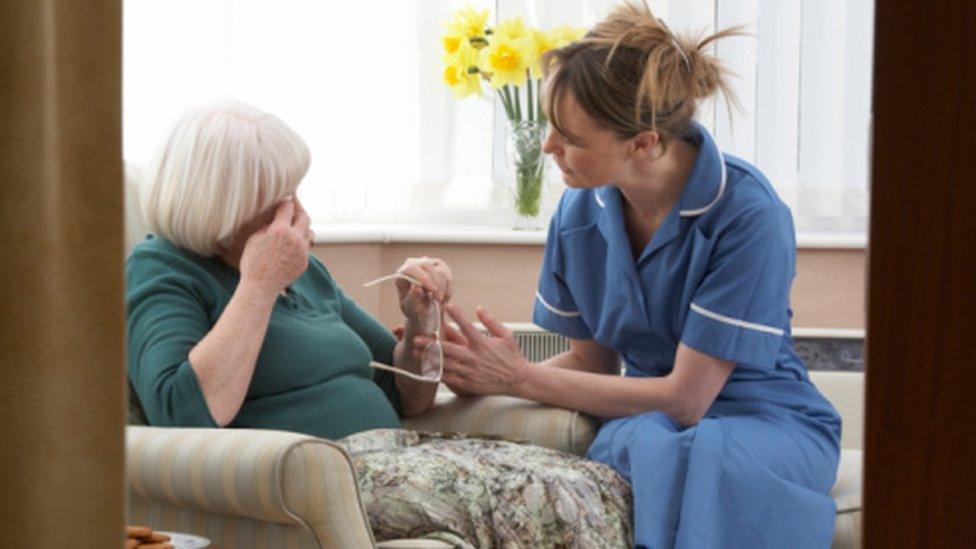Health Secretary Steve Barclay defends delay to social care cap
- Published
Watch: Health and Social Care Secretary Steve Barclay challenged on ambulance deaths
The health secretary has defended the delay to a cap on care costs in England, saying it will allow more funding for social care.
Under the plans people would have paid no more than £86,000 towards their personal care during their lifetime.
Steve Barclay said the delay was a "difficult decision" but the government was committed to the reforms.
He told the BBC the extra funding would help with discharging people from hospitals more quickly.
Mr Barclay said the "prime cause" of this issue was related to social care as people who were ready to be discharged could not be.
He added that this was having a knock-on affect on ambulance delays and challenges in A&E.
"We're prioritising the funding we need to get that flow into the hospitals and key amongst that is getting more funding into social care," Mr Barclay told the BBC's Sunday with Laura Kuenssberg programme.
Mr Barclay said there would be £2.8bn of funding for social care over the next year and £4.7bn the year after, allowing 200,000 more care packages to be delivered.
People who are well enough to leave hospital are often not able to because of a lack of support or care home places in the community.
The social care cap had been due to come into effect in October 2023 but will now be delayed by two years.
County councils in England had urged the government to delay implementation of the reforms because of staff shortages and financial pressures.
But the charity Age UK has said the delay to capping "catastrophic" care costs "raises serious questions over whether it will ever be introduced at all".
Currently most people in England who have savings or assets of more than £23,250 pay for all the care they need at home or in a care home, meaning some may have to sell their house to cover the cost of their care.
Mr Barclay said the pressures on the NHS and social care were "predominantly" due to the impact of the pandemic.
However, pressed on whether issues such as long waiting lists and missed cancer targets existed before Covid, he admitted there were "challenges going into the pandemic".
Gary Smith, general secretary or the GMB union, said he was "incandescent" at the health secretary blaming the pandemic for pressures.
"The Tory government has made ideological decisions for over a decade about cutting services and that's what has left services on their knees and this is not hyperbole or emotion - our care homes were turned into morgues during the pandemic because of mismanagement and cuts," he told the programme.
"People are dying because of cuts to services so I find that interview utterly dishonest and frankly the minister is deluded."
Asked whether long delays for people waiting for ambulances had led to people dying unnecessarily, Mr Barclay said: "If there is a delay in an ambulance getting to someone… then obviously that is a material risk."
He added that this was why it was so important to address handover delays.
Mr Barclay said he also wanted to have fewer central targets and devolve more NHS decision-making to a local level to deliver better value for money.
The extra funding for social care was set out in the chancellor's Autumn Statement on Thursday, along with a £3.3bn annual increase for the NHS budget for the next two years.
Watch: Labour's Jonathan Ashworth repeatedly asked if Labour would have given NHS £7bn
Labour's shadow work and pensions secretary Jonathan Ashworth refused to be drawn on how much money his party would give to the NHS.
He told the BBC that Labour would raise money for public services by growing the economy and investing in jobs and skills.
He added that the NHS also needed more staff and a Labour government would abolish non-dom tax status to fund new doctors and nurses.
Meanwhile, the NHS is facing strike action this year after nurses across the UK voted to walk out over pay.
The Royal College of Nursing (RCN) is calling for a 17.3% pay rise to keep up with the rising cost of living but no UK nation has offered close to that.
Mr Barclay told Sky News's Sophy Ridge the demand was "unreasonable" and three times more than those outside the public sector were receiving.
He said the government had accepted the recommendations of the independent pay review body but his "door is open" for further talks with union leaders.
However, the RCN said Mr Barclay "showed no signs" of intending to come to the negotiating table for "detailed, formal discussions".
The union says years of below-inflation pay rises are compromising care because the NHS is struggling to attract and retain nurses.
Related topics
- Published18 November 2022

- Published6 October 2022

- Published17 November 2022

- Published17 November 2022
